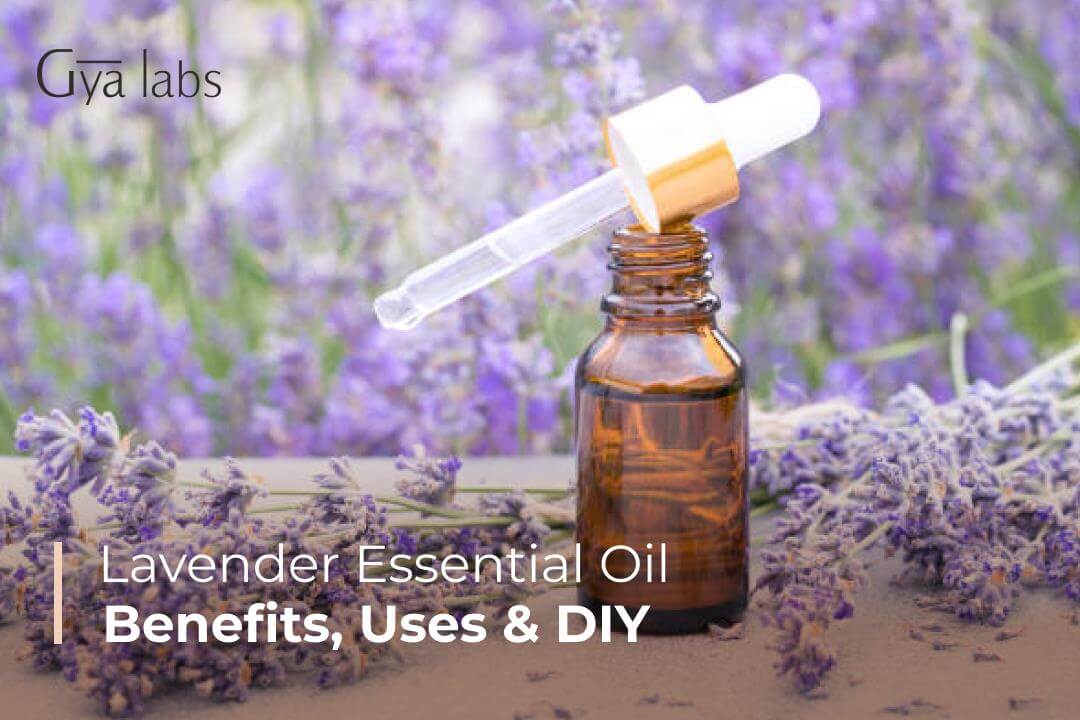The Plant Behind the Oil
Lavandula is a genus of plants, which belongs to the mint family, Lamiaceae. This family of plants include around 47 species of flowering plants. The most common species is Lavandula angustifolia, also known as English lavender. Lavandula plants are native to the Mediterranean region, northern and eastern Africa, and parts of Asia. Its popularity is immense and hence it is cultivated in many other parts of the world.
Lavender plants are known for their aromatic properties. A fully blossomed lavender tree will fill an entire area with its aroma. It is said that in earlier times people would sleep underneath this tree because the aromas would increase the quality of sleep. It is widely used in aromatherapy, perfumery, and herbal medicine. The essential oil is extracted from the beautiful purple flowers of this plant and has a calming effect on the mind and body.
It has widespread uses including taking care of anxiety, insomnia, and other stress-related conditions. Lavender plants are also popular in gardens and landscaping. These plants are easy to grow and have an attractive foliage. The plant is grown in well-drained soil and full sun. Once these plants grow, they become drought-tolerant.
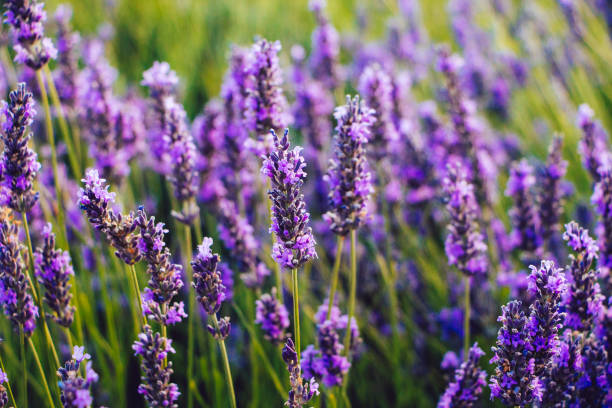
Lavandula has medicinal and ornamental uses, but the plant also has long history of culinary use. (Here, we are talking about the plant and its parts and not the essential oil. The ingestion of essential oil is not recommended or should be done after consultation with a doctor.) The dried and powdered flowers and leaves of the plant are used to flavor teas and other culinary dishes. All in all, Lavandula is a versatile plant with a variety of uses and benefits.
Lavender Essential Oil
The essential oil of lavender is extracted from the flowers of the Lavandula plant. The oil has many benefits and uses which will be discussed here.
Benefits of Lavender Essential Oil
1. Antioxidant Properties
Pollutants, toxins, chemicals and free radicals are one of the main enemies of the body today. It increases the risk factor of several diseases, some of which are quite serious in nature. The free radicals hamper the immune system of the body and rob the body of its ability to fight the attackers. Glutathione, catalase and superoxide dismutase are the antioxidant enzymes that the body creates in response to the free radicals. These enzymes stop the free radicals from harming the body.
However, environment and lifestyle habits will increase the presence of free radicals in the body that these enzymes cannot neutralize. This is where the body needs antioxidants from external sources. Lavender oil is a natural antioxidant that helps the body in its fight against free radicals. The use of lavender essential oil reverses or prevents the damage caused due to free radicals and oxidative stress. That ‘s right… the health benefits of lavender essential oil may help you stay young.
2. Deals with Mental Disorders and Stress
What are neurological issues? Some of these issues are migraines, stress, anxiety, and the dreaded and least talked about ailment depression. A few researches with lavender essential oil have shown that the oil may be useful in dealing with neurological damage. The plant and its oil had been used in dealing with the abovementioned neurological disorders, and now, it is been researched. Some of the studies have shown the positive effect of the plant oil on stress and anxiety.
A study was conducted on patients who were supposed to undergo surgery. It was found that the patients who inhaled the aroma of lavender as a part of aromatherapy were more confident before going in for surgery. The aroma of the oil was also helpful post operation due to its sedative nature. It helped the patients relax and get proper sleep. And the best part of the study was that the oil did not react with any of the medicines. It was also found that the oil was better in dealing with generalized anxiety disorder than any placebo treatments.
Another study has concluded that diffusing lavender oil in homes reduced the intensity of postnatal depression. Another study on people suffering from PTSD showed that aromatherapy with lavender oil ensured better sleep and lower moodiness. The steps for aromatherapy for sleep and stress are simple. Place a diffuser near your bed or in your bedroom. Add few drops of lavender oil to the diffuser 1 hour before your bedtime and inhale its aroma while relaxing.
Patients scheduled for a surgical procedure are nervous and anxious. A study published in the Journal of PeriAnesthesia Nursing on 2018. In this study it was showed that inhaling the aroma of lavender oil decreased the anxiety levels of patients before surgery (1).
3. Lavender Oil and Cognitive Improvement
Although there is a modicum of evidence to suggest that lavender oil may have a positive effect on brain and its function, more research and human trials are needed to fully understand its mechanisms. One of the ways in which lavender oil is thought to improve brain function is its ability to promote relaxation by reducing stress and anxiety. These two mental issues (Stress and anxiety) have a negative impact on cognitive performance. Just think about your performance in an exam or interview when you are stressed. Lavender oil counters this by promoting feelings of serenity and relaxation.
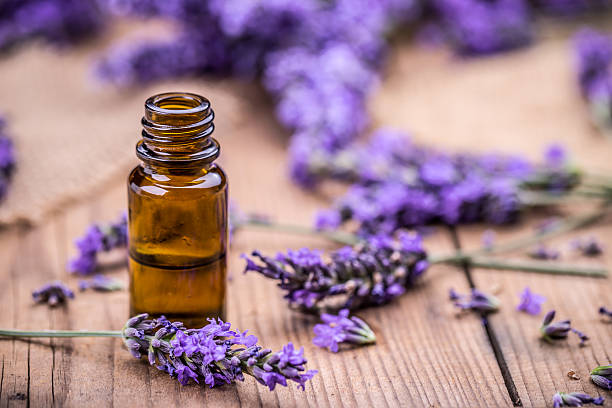
Lavender oil has mild sedative properties, which may improve sleep quality of an individual. A good night’s sleep is important for improved brain function. Thus, by promoting better sleep, lavender oil may indirectly improve cognitive function. There are some proponents who suggest that lavender oil may have a direct effect on the brain and its functioning, but for the lack of concrete evidence we will disregard that for now. There are also studies with contradicting results. One study found that inhaling lavender oil improved cognitive function in a group of participants, however in another group of participants there was no significant effect.
To conclude, there is some evidence to show that lavender oil may have a positive effect on brain function. However, there is a need for more studies and human trials. Although a person can start using lavender oil for some ailments, it is always a smart choice to consult a physician first.
4. Lavender Oil for Wounds, Scars and Burns
Lavender oil has been used for wound healing and burn treatment. Why? Because it has compounds that have anti-inflammatory, antimicrobial, analgesic, and antiseptic properties. As with every other property on this list, more research is needed to know about the healing properties of lavender, however, some evidence does suggest that lavender oil may be useful for treating minor wounds and burns.
One study even found that applying a lavender oil-based ointment to surgical wounds reduced pain and accelerated healing when compared to a placebo ointment. The same result was achieved when another study used lavender oil to second-degree. Lavender oil has antimicrobial properties; thus, it prevents the wounds from getting infected.
Lavender oil, an essential oil for scars, is a popular choice due to its therapeutic benefits. Known for its calming and healing properties, lavender oil aids in reducing the visibility of scars by promoting skin regeneration. Its gentle nature makes it suitable for all skin types, including sensitive skin, making it an ideal natural remedy.
Now, while applying lavender oil on wounds, it is important to note that it should never be applied directly. Essential oils must be diluted in a carrier oil or added to a cream or ointment before being applied topically especially when applied on wounds. And, as usual, consult a doctor before using this oil.
The journal BMC Complementary and Alternative Medicine on May 2016 published a study that investigated the effect of lavender oil on wound healing. The study concluded that topical application of lavender oil had the potential to promote and accelerate wound healing. (2)
5. Sleep, Rest, Peace
Lavandula and lavender oil has sedative and calming qualities. It can hence be diffused to take care of sleep issues including insomnia. It is not a treatment, but an excellent supplementary support. Research has shown that lavender oil improved the sleep quality of hospitalized patients. Women in their postpartum period experienced better rest and good sleep after lavender oil was introduced into their routines. The women who inhaled the oil were better off than the ones who were given a placebo treatment.
Many studies have shown that lavender oil improved the quality of sleep, combats insomnia and increased the duration of sleep. And if that wasn’t good enough, lavender oil does not cause any adverse reactions. Place a diffuser near your bed or in your bedroom. Add few drops of lavender oil to the diffuser 1 hour before your bedtime and inhale its aroma while relaxing. A few drops of the oil can be added to the pillow case as well to improve sleep. Or you can opt for a relaxing bath in the evening with a few drops of the oil added to the bath water.
Inhalation of the aroma of lavender essential oil can induce sleep. A study published on December 2012 in the European Journal of Integrative Medicine looked into the effects of lavender inhalation on sleep problems. The results were positive, with the researchers mention the need for more scientific data. (3)
Uses of Lavender Essential Oil
There are benefits of using lavender essential oil. Now, it is time to utilize these benefits and put them to use.
1. For Acne and Skin Inflammation
Lavender essential oil is known for its ability to heal the skin. Its potent antimicrobial, antibacterial, and anti-inflammatory properties make it effective for treating various skin issues such as eczema, psoriasis, and seasonal allergies. Additionally, it has been proven to be highly effective in treating acne flare-ups and doing away with blemishes.
For this a few drops of lavender essential oil can be added to carrier oil of choice and applied on the skin or acne regularly. The carrier oils can be coconut or virgin olive oil. Other oils can be used as well based on preference and availability. Add a few drops of lavender oil to carrier oil and apply on skin to remove dark spots.
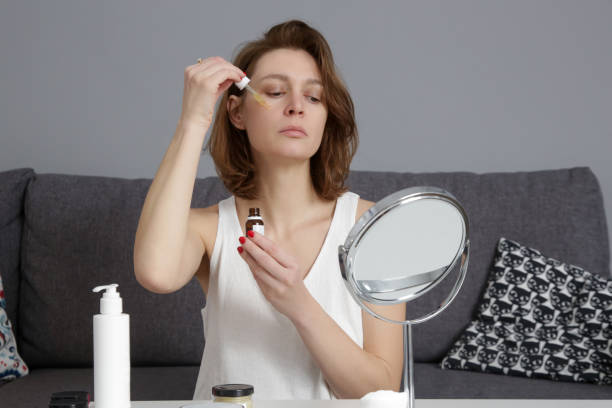
2. Anti-Ageing Aid
Lavender oil is popular for its anti-aging benefits as an essential oil. It has antioxidant and anti-inflammatory properties, which help nourish the skin and promote a healthy glow. The antioxidant nature of the oil fights free radicals and prevents wrinkles and diminishes age spots and dark marks. The lavender essential oil has astringent properties as well that gives the skin a fine texture and helps keep the skin looking youthful and healthy. A few drops of lavender essential oil can be added to carrier oil and applied on the skin (and face) regularly.
3. Tool Against and Bug Bites
Lavender oil has a soothing effect when it is applied on bug bites. As mentioned earlier, the oil has analgesic properties which relieves pain and it has anti-inflammatory properties that prevents redness and swelling. It also heals the region faster. The aroma and compounds of lavender oil may also repel flies, ants and mosquitoes, amongst other pests. Use lavender essential oil for ants to create a natural repellent spray. Simply add a few drops of peppermint oil to a spray bottle filled with water, and mist around your home where ants are a problem.
4. An Ad hoc First Aid
Lavender essential oil has antimicrobial, antifungal and anti-inflammatory properties. It can be applied on the wounds, cuts, bruises, burns and sunburns in case of emergencies. Of course, medical assistance should be sought immediately.
5. Oil for Aroma Diffuser
Lavender oil has a pleasant floral aroma and has sedative properties. Place an aroma diffuser near your bed or anywhere in your bedroom. Add few drops of lavender oil to the diffuser 1 hour before your bedtime and inhale its aroma while relaxing. This will help a person fall asleep sooner with improved sleep quality. Lavender aromatherapy is quite popular because of its floral aroma. It can also be used as a massage oil.
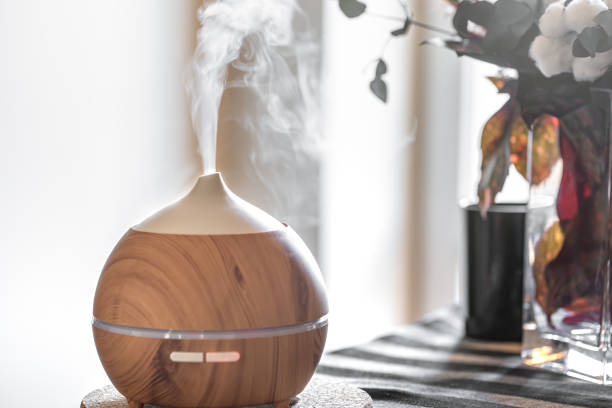
6. Essential Oil for Oral Health
Lavender oil is good for your teeth as well as gums because it fights germs and swelling due to its antimicrobial and anti-inflammatory properties. This stops plaque build-up and gum infections. You can add a couple drops of lavender oil to your toothpaste or mouthwash. Or simply mix it with coconut or sweet almond oil. This blend can be used as a mouthwash or for oil pulling.
How to make lavender mouthwash – mix 2-3 drops with warm water and gargle it in your mouth, and then spit it out. How to make lavender oil solution for oil pulling – mix a few drops of lavender oil with a carrier oil and swish it around in your mouth for a while. Later spit it out and rinse your mouth. Do not swallow the oil.
7. Fight Stress with a Bath
A tiring day can be made better with a nice bath. Soak yourself in a bath tub with warm water mixed with lavender essential oil and Epsom salt and relax. Lavender oil has antidepressant properties that calms the mind and body. This oil is preferred by postpartum women. Lavender’s aroma is floral and help soothe the jittery nerves. It can be blended with another oil and applied on the wrist and neck to induce calmness.
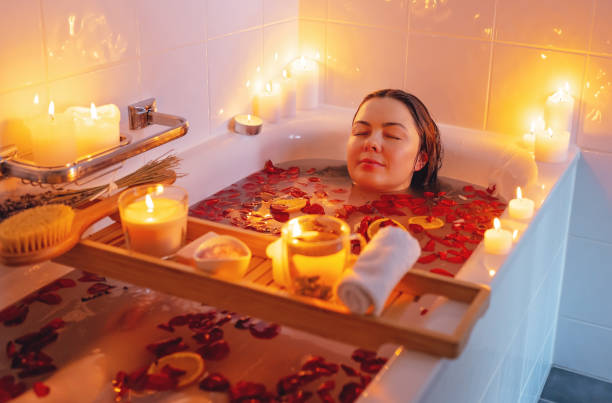
8. Lavender Oil for Hair and Scalp
Lavender oil has properties that have a soothing effect on the scalp and has ingredients that nourish the scalp and hair, thus triggering hair growth. Scalp massage with lavender oil is a good way to boost blood circulation and improve hair health.
Mix a few drops of lavender oil with a carrier oil like coconut or jojoba oil or olive oil or ant hair oil, and massage it onto your scalp. Massaging is mandatory as it boosts blood circulation. This improved blood circulation to the scalp stimulates hair growth. Leave the oil on for at least 30 minutes before washing it off.
Must read how to mix essential oils for hair growth.
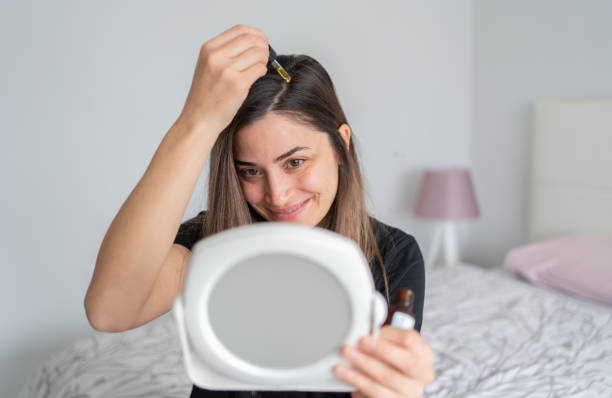
DIY Recipes with Lavender Essential Oil
Recipe #1 – Sweet Siesta with Lavender
Ingredients
- 5 drops of lavender essential oil
- 2 drops of neroli essential oil
- 4 drops of chamomile essential oil
- 2 drops of sweet orange oil
[amazon box=”B0751BWMNZ,B076P5VMJ1,B079JJ8LBT,B075J9VK3P” grid=”4″]
Instructions
Diffuse this oil in the afternoon and enjoy a peaceful siesta.
Recipe #2 – Deep Slumber with Essential Oils
Ingredients
- 4 drops of lavender essential oil
- 2 drops of ylang ylang essential oil
- 2 drops of patchouli essential oil
- 3 drops of bergamot essential oil
Instructions
Add all the ingredients directly to an aroma diffuser which is in the bedroom. Start it at least 30 minutes before bedtime to enjoy a reinvigorating slumber.
Recipe #3 – Stress Relief Massage Blend
Ingredients
- 8 drops of lavender essential oil
- 5 drops of mandarin essential oil
- 3 drops of lemongrass essential oil
- 3 drops of frankincense essential oil
- Half a cup of avocado oil
Instructions
Mix all the oils together and apply it on the body. In circular motions apply the oil blend. Use gentle pressure and massage till the oil is absorbed.
Recipe #4 – Calming Bath Mix Blend Recipe
Ingredients
- 10 drops of lavender essential oil
- 8 drops of marjoram essential oil
- 5 drops of cedarwood essential oil
- 3 drops of clove bud essential oil
- Epsom salt
Instructions
Mix the oils blend to a bucket of warm water. If you have a bathtub, then soak yourself for at least 20 minutes. Relax and enjoy the fragrances from the water.
Recipe #5 – Simple Face Pack Recipe
Ingredients
- 5 drops of lavender essential oil
- 2 drops of tea tree essential oil
- 1 tablespoon of honey
Instructions
Massage the face with this mixture and allow it to stay for 20 minutes before washing it off with a mild face wash.
Quick Rewind
Lavender essential oil comes from the plant Lavandula, which belongs to the mint family of plants called Lamiaceae. The tree, and ergo the oil, from the tree has medicinal and therapeutic properties. The lavender essential oil has many therapeutic properties including antioxidant, antimicrobial and anti-inflammatory.
Because of these properties lavender essential oil is useful for treating several ailments including skin conditions, sleep issues and wounds. Lavender oil may help in healthcare and remedy issues with nervous system. Some people may experience side effects or allergic reaction including vomiting, itchy skin, rash and discomfort.
Frequently Asked Questions
How do you use lavender essential oil in your home?
There are a few ways of using lavender essential oils at home.
1. Inhalation – Lavender oil can be added to an aroma diffuser and its aroma can be diffused in a room for aromatherapy. Or, a small fraction of the oil can be mixed with water and stored in a spritzer and later used as a room freshener.
2. Topical application – The oil can be applied on the hair, scalp and face.
3. Disinfectant – The oil can be used to disinfect surfaces and floors.
What are the benefits of smelling lavender?
Inhaling the aroma of lavender oil has several benefits:
1. It results in peace of mind.
2. It refreshes the mind
3. It helps attain rest.
Can I apply lavender oil directly to skin?
Essential oils are concentrated plant oils and should not be applied on the skin directly. It must be diluted as instructed on the label.
What is the best mix with lavender oil?
Lavender oil is a versatile oil that goes well with most oils. Some of these oils include – bergamot, peppermint, eucalyptus, lime, orange, tangerine, clove, palmarosa, patchouli, cypress, cedarwood and more.
Can you sleep with lavender oil?
Diffusing lavender essential oil before sleeping is a common practice followed by most proponents of aromatherapy. The aroma of the oil enhances sleep quality.
Source
- Effect of Lavender Oil on the Anxiety of Patients Before Breast Surgery https://www.sciencedirect.com/science/article/abs/pii/S1089947218303563
- Wound healing potential of lavender oil by acceleration of granulation and wound contraction through induction of TGF-β in a rat model https://link.springer.com/article/10.1186/s12906-016-1128-7
- Lavender and sleep: A systematic review of the evidence https://www.sciencedirect.com/science/article/abs/pii/S1876382012010700
